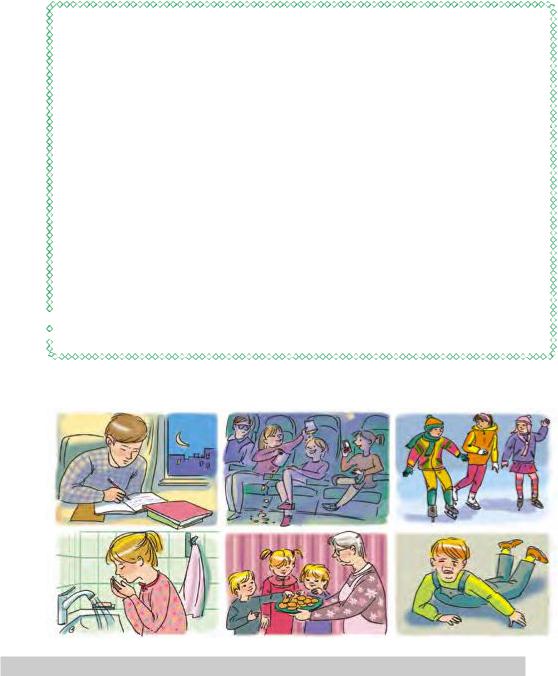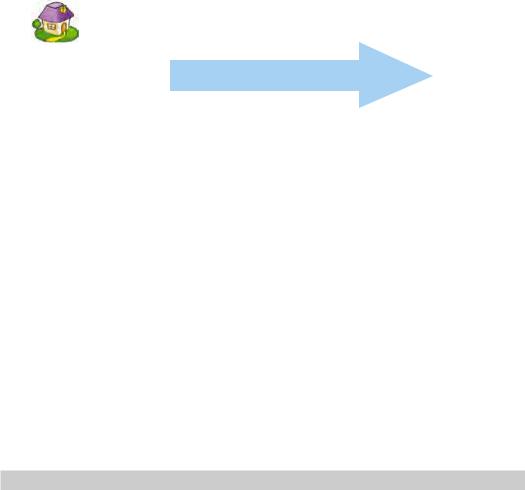

UNIT 1
The most serious drawback of spending time with friends is that it takes a lot of time, day after day. As the proverb goes, friends are thieves of time.
Another negative thing is that some friends can’t share your interests to the fullest. They may find them strange and sometimes try to make you do what they think to be more fun…
Go to Ex. 19, 20 of your WB
1.5.My progress in English
I.Grammar Smart
Fill in the right forms of the verbs to be or to have.
1. ... your elder sister married?
2.My father ... been to Canada.
3.Why ... I in the photo?
4.My mum ... on a visit to her in-laws then.
5.I ... looking for a part-time job now.
6.Let’s ... a rest.
Check if you can:
use correct grammatical forms in context. |
Yes |
No |
|
|
|
II. Word Smart
Add one word to each sentence in the blank.
1.My father’s brother is my … .
2.I’m going to follow in my mum’s … .
3.My aunt is a surgeon, she performs complicated … .
4.Please answer all the questions of the … .
5.What makes you feel …?
6.Calm down, there is no point in losing your … .
Check if you can:
use words in context. |
Yes |
No |
|
|
|
38

1.5
III. Function Smart
Match conversation lines A to conversation lines B.
|
A |
B |
|
|
|
1. |
Gee, I’m angry! |
a) I feel out of my element. |
2. |
What’s wrong? |
b) It happens to the best of us. |
3. |
Terrible! Just terrible! |
c) Try a little harder. |
4. |
I often find it difficult to talk |
d) Calm down. |
|
with my parents. |
e) I think you should socialize with |
5. |
What shall I do? |
friends more. |
6.I started to have difficulties with f) You are a worrier. Maths.
Check if you can:
talk about problems and solutions. |
Yes |
No |
|
|
|
IV. Time to Read
Read the text and choose the correct facts.
Family Footsteps
We all have someone in our family who we admire. From my perspective, these people are essential for us as we have somebody to mirror ourselves. In my case, the person I most admire is certainly my grandfather, whose life story inspires me.
He was born in a small village. He was the son of a journalist who used to fight alongside the small farmers against powerful landowners. He, his mother and brothers used to live happily until the day his dad was killed. He was just six years old when he started working to help his mother. Life was hard but he never gave up, so after a lot of work and dedication he achieved his dream and graduated in law from one of the best colleges in the country.
Everyone has dreams but there are few people in the world strong enough to fight for them. Surely, my grandfather is one of these people. It is always a pleasure to hear about his life experiences. I’m going to follow in his footsteps so that I can be a better person.
1.The storyteller admires his grandfather.
2.The old man was born in a city.
3.He came from a small family.
4.He was a hard worker.
5.He got a higher education.
6.His dream came true.
Check if you can:
read and understand life stories. |
Yes |
No |
|
|
|
39

UNIT 1
 V. Time to Listen
V. Time to Listen
Listen to the funny story ‘The Trouble with Teenagers’ and correct the mistakes in the statements given.
Statements:
1.Kevin was in his mid-teens.
2.His parents bought him a new board game as a present.
3.His appearance changes a little.
4.Kevin’s parents are crying.
5.Kevin loses the ability to shout.
6.Teenage years are easy.
Check if you can:
listen to funny stories and fully understand |
Yes |
No |
them. |
|
|
|
|
|
 VI. Time to Write
VI. Time to Write
Describe your family and friends.
Check if you can:
write a description of your family and friends |
Yes |
No |
|
|
|
40

UNIT 2.
BALANCE YOUR SCHOOL LIFE
2.1. Making the most of your school day
Word Bank |
Phrase Bank |
Communication Box |
day planner |
to find yourself on the Inter- |
Let’s go for it! |
to prioritise |
net a lot |
... I bet. |
schedule |
to study in a quiet environment |
Thanks for sharing. |
due-date |
to avoid distractions |
It’s up to us to ... |
margin |
to organise oneself |
For instance, ... |
random |
to sort out one’s life as a teena- |
|
|
ger |
|
|
to set homework time |
|
|
to run off one’s feet |
|
|
to take control of something |
|
|
to get good grades |
|
I. Conversation Warm-up
Read what you can hear at different times of your school day. Say who usually says these words and when.
Wake up! Wake up! |
Number One bus |
It’s time to get up! |
is coming. |
It’s time you got down to doing your home work, isn’t it dear?
I’ve made your favourite meal for dinner. Are you hungry?
Good morning, boys and girls!
E x a m p l e: My mum usually wakes me up at half past six.
 II. Pronunciation Warm-up
II. Pronunciation Warm-up
Read the extract from the teen poem “School Life” and practise the sounds /ö/ and /U/. Say how you look at school.
School Life
School is a daily routine for us,
In the morning, we’re sure to make a fuss.
Even when the sun is still not up,
Here we are, awake at 6 a.m. sharp
41

UNIT 2
Late a minute and we have to run, Eyes half open, shoelaces undone.
We reach school and we see our friends, Immediately, discomfort ends.
Some may see school as a lot of pressure Some cannot wait for the winter vacation But it depends on how we look at school Honestly, positively, school is cool!
Cheryl Theseira
(Abridged and adapted from the source:http://www.bestteenpoems.com/poem/ school-life#6Zkmo5x3HVrwd9tb.99)
III. Grammar Smart
1. Look and recall.
Personal and possessive pronouns
I |
me |
my |
mine |
you |
you |
your |
yours |
he |
him |
his |
his |
she |
her |
her |
hers |
it |
it |
its |
– |
we |
us |
our |
ours |
they |
them |
their |
theirs |
a) Play a grammar completion game. Use the pictures and the information given.
E x a m p l e: A: This is my friend Sam.
B:He is a teenager, isn’t he?
C:His hobby is football, isn’t it?
A:Right.
friend |
niece |
classmates |
teacher |
Sam |
Alice |
classroom |
Maths |
thirteen |
Grade One |
English lesson |
technology |
football |
backpack |
homework |
interactive white |
|
|
|
board |
b) Paraphrase the sentences.
E x a m p l e: This is my daily planner. → This daily planner is mine.
42

2.1
1.Are these your papers?
2.Tom is one of my friends.
3.I have my own time management method.
4.Does this book belong to you?
5.We are going to present our project to the class.
6.Whose folder is it? His or hers?
2. Read and remember!
Reflexive pronouns
|
|
myself |
yourself |
himself |
|
herself |
|
|
|
itself |
ourselves |
yourselves |
|
themselves |
|
|
|
oneself |
|
|
|
|
|
|
|
|
|
|
|
|
|
• Use reflexive pronouns: |
|
|
|
|
|||
1. |
when the subject and object of a sentence are the same person or thing; |
||||||
E x a m p l e: You should organise yourself. |
|
|
|||||
2. |
if you want to emphasise the subject of a sentence; |
|
|
||||
E x a m p l e: I’ll do it myself! |
|
|
|
|
|||
3. |
with some verbs: |
|
|
|
|
|
|
E x a m p l e: Enjoy yourself! |
|
|
|
|
|||
|
|
Help yourself to ice cream. |
|
|
|||
|
|
Kids, please, behave yourselves. |
|
|
|||
Don’t forget!
 Don’t use reflexive pronouns with the verb feel:
Don’t use reflexive pronouns with the verb feel:
 E x a m p l e: How do you feel?
E x a m p l e: How do you feel?
a) Let’s play a grammar transformation game (p. 43–44). Use the corresponding personal and reflexive pronouns for the pictures.
43

UNIT 2
to organise oneself |
to wash oneself |
to behave oneself |
to help oneself |
to enjoy oneself |
to hurt oneself |
|
|
|
E x a m p l e: A: to organise oneself
B: He can’t ...
A:He can’t organise himself.
b)Add a reflexive pronoun.
E x a m p l e: I’ll do it myself. |
|
|
|
|
|
|
|
|
|
|
|||||
1. |
Behave |
|
! |
|
|
|
|
4. |
Please help |
|
|
|
to peaches. |
||
|
|
|
|
|
|||||||||||
2. |
You should organise |
|
|
. |
5. |
Enjoy |
|
|
. |
|
|
|
|||
|
|
|
|
|
|
|
|||||||||
3. |
How did you hurt |
|
? |
|
6. |
Have you washed |
|
|
yet? |
||||||
|
|
|
|||||||||||||
IV. Word Smart
1. Study these words and word combinations and:
a) Say what time management tips you are ready to follow. Give your reasons.
|
Time Management Tips |
|
|
Get a day planner |
• Make sure it is big enough to hold all your notes; |
|
• Write everything down; |
|
• Put your homework assignments, test dates and |
|
project due-dates on paper. |
|
|
Organise yourself |
• Keep your schoolwork and papers organised; |
|
• Keep each class or subject in its own folder; |
|
Set homework time; |
|
• Make sure you study in a quiet environment to |
|
avoid distractions. |
|
|
Prioritise your acti- |
• Make sure academic studies come first; |
vities |
• List your leisure activities as the least impor- |
|
tant; |
|
• Don’t spend too much time in the Internet. |
|
|
E x a m p l e: I am ready to get a day planner so that I could have all the important information in one place rather than on random pieces of paper.
b) Group up the word-combinations into Have-to’s and Want-to’s and say how you manage to balance between them (p. 44–45).
to watch a TV show; |
to do school assignments; |
||
to hang out with friends; |
to be alone with your thoughts; |
||
to read a book; |
to practise a hobby; |
to do sports; |
|
to keep your room clean; |
|
to find yourself on the Internet a lot; |
|
to help your little brother with homework; |
to revise for a test. |
||
|
|
|
|
44

2.1
HAVE-TO’S |
WANT-TO’S |
|
|
to revise for a test |
to watch a TV show |
|
|
E x a m p l e: Suppose I have to revise for a test, though I want to watch my favourite TV show. If I am trying to concentrate on my studies while the TV is on, I will be constantly distracted. So I have to stay away from the TV.
2. Complete the sentences and speak about your method of finding the perfect balance in your school life.
1.Sometimes I feel there isn’t enough ... .
2.I just don’t know how ... .
3.So I have worked out my own method of ... .
4.It has ... steps.
5.Step One is about ... .
6.Step Two is ... .
7.Step Three ... .
8.It helps me to ... .
At Home: Describe your recent school day and decide if you made the most of it (8–10 sentences).
Go to Ex. 21, 22 of your WB
V. Time to Read
1. Read/listen to the dialogue and say what tips for time management it has.
Talking about Managing your Time
Cheryl: Hi, Mike, where are you going? What’s your hurry?
Mike: Hi, Cheryl. I’ve been trying hard to keep up with school work, getting good grades, and after-school activities.
Cheryl: I know what you mean. Do you feel there aren’t enough hours in the day and you just don’t know how some people manage to do everything in time?
Mike: Exactly. Have you got your own method for taking control of schoolrelated have-to’s?
Cheryl: Not yet, but I’ve got some good tips. During the school day our schedule is made up for us. Once the bell rings, though, it’s up to us to find the perfect balance between have-to’s and want-to’s.
Mike: Let’s have a try!
Cheryl: Okay, okay. First of all, get a day planner to put your homework assignments, test dates and project due-dates on paper as soon as the teacher gives them to you.
45

UNIT 2
Mike: Are you serious? I’m quite happy with writing everything down in my notebook margin or…
Cheryl: Or on random pieces of paper? If you keep your day planner with you, all this information will be in one place. Make sure you get the big day planner because little ones won’t hold all your notes.
Mike: Well, perhaps, I’ll try. What is next?
Cheryl: Then you need to organize yourself. Keep each class or subject in its own folder, set homework time and make sure you study in a quiet environment to avoid distractions, such as TV, the phone, or the Web.
Mike: It’s easier said than done. I prefer to have business and pleasure combined. For instance, I can read my homework while my favourite TV show is on.
Cheryl: I bet it will take you much longer to finish your reading because you’ll probably spend half your time listening to the show.
 Half the time
Half the time
 Half of it
Half of it
 See First Aid Kit: Grammar in Use, p. 222
See First Aid Kit: Grammar in Use, p. 222
Mike: Perhaps you are right. But I’ve got so many things to do that I can’t afford to just sit and watch TV.
Cheryl: Same with me. Yet I’ve learnt to prioritise my activities. Academic studies should always come first, and I try not to spend too much time on the internet.
Mike: Well, thanks for sharing. It seems to be an easy-to-follow guide. I hope it will help me to manage my time.
Cheryl: It sure will. Good luck!
2. Choose the right variant.
E x a m p l e: Half – |
(of; –) a kilo of meat, please. |
||||||||||||
1. |
I spent half |
|
|
|
|
(– ; of) my time listening to the show. |
|||||||
|
|
|
|||||||||||
2. |
Nearly half |
|
|
|
(of; –) my classmates use daily planners. |
||||||||
|
|
||||||||||||
3. |
There were half |
|
|
(– ; of) a dozen people in the line. |
|||||||||
|
|
||||||||||||
4. |
Don’t worry, it will only take half |
|
|
(–; of) a minute. |
|||||||||
|
|
||||||||||||
5. |
She was only telling them half |
|
|
(of; –) the story. |
|||||||||
|
|
||||||||||||
6. |
It happened in the second half |
|
|
(of; –) the twentieth century. |
|||||||||
|
|
||||||||||||
3. Read the replies (p. 47) and match them to the characters of the dialogue. Reproduce the parts of the dialogue with them.
46

2.1
Mike 
Cheryl
–I’ve been trying hard to keep up with school work, getting good grades, and after-school activities.
–I’ve got some good tips.
–Then you need to organize yourself.
–It’s easier said than done.
–I’ve learnt to prioritise my activities.
–It seems to be an easy-to-follow guide.
VI. Time to Communicate
1. Act as one of the teenagers and describe your time management method. Use:
to try to keep up with something; to take control of something;
to find the perfect balance between … and …; to organize oneself;
to study in a quiet environment; to avoid distractions.
2. In pairs, discuss your time management methods. Use the pattern.
Pattern:
A:Hi, … , Where … ? What’s your hurry?
B:Hi, … . I’ve run off … .
A:I know what you mean. Do you feel …?
B:Exactly. Have you got your own method for… ?
A:Not yet, but I’ve got … .
B:Let’s go for it!
A:Okay, okay. First of all, get … .
B:Are you serious? I’m quite happy with … .
A:Make sure … .
B:Well, perhaps, I’ll try. Whatever next?
A:Then you need to … .
B:It’s easier said than done. I prefer … . For instance, … .
A:I bet it will … because … .
B:Perhaps you are right. But I’ve got so … .
A:Same with me. Yet I’ve learnt to … .
B:Well, thanks for sharing. It seems to be … . I hope … .
A:It sure will. Good luck!
47
